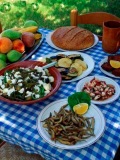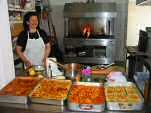How to eat in Greece
A cheap guidebook or a blog article often gives you a list of restaurants along the waterfront or in the town square which any one can see when stepping off a ferry or pulling into town on a bus. The authors of many of these books have been paid by the establishments to be listed.
Alternatively you can learn to make good choices on your own. The first thing to understand about eating in a foreign country is not so much what you can eat, but the local customs and eating habits. If you understand this, then you've advanced a long way in knowing how to eat in a foreign country.
And this is not the sort of information you find in guide books.
When Greeks go out, they have lunch at about 1.00pm and dinner no earlier than 9.00pm. This is why if you walk around looking for a restaurant patronized by the "locals" as a sign of quality, it is very likely to be deserted before 9.00pm. It is not unusual to arrive at a restaurant at 11:00pm, especially in the summer. However if you would like to eat earlier than 9:00pm there is no problem at all. Tavernas are open from about 6:00pm.
It is very important that the place you are looking for has a Greek name. It is not a must, but Greek law forces every eating establishment to have the name written at least in Greek Letters.
However, most of the very touristy places ignore this law and insist keeping their names in Latin (English) letters even if their name is a Greek word, in order to attract more customers who might not feel welcome. That philosophy though does not only spoil the local atmosphere of the establishment but it also says,” are you tourists? Yes we are here for you” they even display pictures of their meals on large boards outside
If you see a tavern that has the notice written only in Greek then this is a good sign anyway.
If you go to some types of restaurant in Greece, sit down at a table, and the waiter comes up with a menu and expects you to order from it, you are in the wrong place. 
A lot of tourists miss out on the best that Greek cooking has to offer, simply because they eat at tourist-oriented establishments, geared to a large and fast turnover of clientele.
They work under the mistaken assumption that good eating means paying cheap at a busy restaurant which has special set menus. The food served there is OK, but the more they cater to package tourists, the more likely you're going to get fairly unimaginative fare -- fixed plates garnished obnoxiously with canned carrots, peas and chips.
Talking about chips, the Greek population does eat chips but only if they are fresh and cut by hand. not those frozen "Fast-food Chips" that you can find in every fast food restaurant.
Authentic Greek Tavernas do not have fixed menus.
The Greeks construct their meal from what's on offer that day (actually, a common habit around the Mediterranean). Indeed, have a look at a group of locals out on the town and you'll see a table full of maybe 6-8 plates of things from which everyone helps themselves.
Greece is a great place to eat out with company if you know how.
Menus are as good as useless. They simply list the prices of selected items, but do not necessarily reflect what the cook has prepared that day. The easiest thing is to ask the waiter what he recommends and let him explain to you all about it. A Greek waiter would insist on telling you about the dishes of the day because he wants you to choose the best so that you are satisfied and he gets a good tip. I have noticed sometimes that guests cannot order what they can't pronounce on the menu, but after having asked me they enjoyed it. I would recommend you to ask not only for the menu but what there is cooked to eat today.
For Corfiots, a meal is a social occasion and accordingly, food is ordered for the "table", not for the individuals. You order a bit of everything, spread it around the table, or more often cover the table with different dishes and everybody picks at everything. If or when more food is needed, more is ordered. There is also quite an element of status involved in the ordering and it is not uncommon for Greeks to order far too much, either to show off their status or to show their generosity. This unfortunately leads to a fair amount of food being wasted.
You can of course stick to the Western habit of not sharing food but order for each person,. Greek people are used to foreigners and their habits, but you will miss out on an enhanced eating experience. It's very common to order a number of appetizers “for the table” and you main course individually.
Use of the fingers instead of forks and knives is very common. After all, food is there to be touched and eaten, not picked at. Eating meat (especially lamb, chicken or fish with a fork and knife is considered a little silly because you are missing out on the most sensual part of the experience.
Bread is used with the meal to push the food on the fork and to soak the oily liquids that remain from the food.
The olive oil which is used is absolutely not harmful for to your digestive system. Fish is present in many types of taverna and is served in almost any restaurant.
Greeks would also consume with their meal wine, beer, water end refreshments like soda and cola, but they will never combine the food with vodka gin or any other imported drinks.
If you are a Vegetarian or a vegan, although there are almost no Corfiot vegetarians, there is plenty of choice for you and it is quite well accepted that some people don't eat specific foods, so don't worry, you won't starve.
As with ordering, paying a bill has a lot to do with offering hospitality.
I have never seen Local Corfiots sharing the payment of a meal (at least not in a way that could have been visible to others). One will pay for all and there is often a hefty argument about who will have the privilege of paying. As such, if you, a foreigner, are eating with Corfiots you will be pretty hard put to foot the bill, unless you resort to sneaky ways such as paying the bill away from the table when no one is looking. Even this can lead to awkwardness because the traditional Corfiot hospitality makes it almost a duty to act as the host to foreigners.
Again here, Corfiots know that our customs are different and that we sometimes share the cost of meals, but avoid asking for a separate bill for each person and work out the share of the bill between yourselves:
Greeks find this splitting down of bills to be a deplorable habit and the Greeks have nicknamed this 'Going German' (instead of the English 'Going Dutch').. Even if it says everywhere that tips are included in the price it's normal practice to give tips if you're satisfied with the service you have had. About 10% would be appropriate. Normally when the Greeks go out for dinner, they traditonally pay cash. No cheques and credit cards! And they have always got money enough to pay for others. Nowadays strictly all places accept credit cards, so there is not going to be a problem. Never the less, ask if they accept credit cards if you are not sure.
All these customs are not unbreakable laws and they do differ between families and between villages.
Thank you for the time you spent to read this article,
Enjoy your food,
Dimitris Kourkoulos
Brouklis Taverna
Arillas 49081 Corfu
+302663051418
www.brouklis.com



